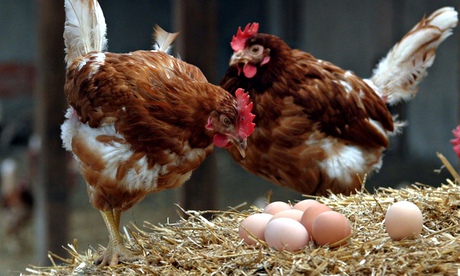
While studying natural selection, William Muir, a geneticist at Purdue University, ran an experiment measuring the egg-laying productivity of two flocks of chickens. The first group was a so-called free flock, in which animals could roam and mingle as they pleased, while the second comprised only the most productive birds. After several generations, the free flock was cranking out eggs at a furious pace. But for the descendants of the high achievers, it was a different story. Most had been killed by hens that saw them as rivals, and the few survivors were in a sorry state, harrying and pecking at one another unforgivingly. "That describes my department," said one of Muir's colleagues shown evidence of the damage.
One of many scientific studies referenced in Margaret Heffernan's new book, the parable of the chickens is intended to show what can happen when a group of über-competitive individuals is brought together. Economists have taught us that competitive self-interest ultimately benefits everyone and makes society more productive, but Heffernan believes the opposite. In her view, the ascendancy of competition in all walks of life has impoverished people and the planet in countless ways.
This is a brave exercise. The idea that competition is a necessary force for good is deeply ingrained in our collective psyche. Many ridicule the adage that taking part matters more than winning, regarding this as an excuse for mediocrity and underachievement. Others will see the spectre of communism in any anti-competition diatribe. Realising her challenge, Heffernan makes clear from the outset she is no apologist for the Soviet Union, which actually prioritised competition in many areas, and that she is not against competition per se. "We are all competitive but we are not only competitive," she says.
What follows is a meticulously researched and engagingly written argument that even the most strident proponents of competition will find hard to refute. Tackling subjects as diverse as family life, sports and education, the early chapters show how an obsession with competing has stripped so many activities of their true value – the only goal being to come first at any cost – and benefited the few at the expense of the many. Increasingly eager to assess students and schools through tests and rankings, Britain and America still lag behind egalitarian, exams-averse Finland on educational proficiency, according to one high-profile study. Competition has also spawned an epidemic of cheating and illicit behaviour, writes Heffernan. For an indication of that, look no further than the Olympic Games – "full of corruption, cover-up, performance-enhancing drug use", in the words of Victor Conte, who was convicted in 2005 of supplying steroids to athletes.
Just as revelatory are the sections dealing with the various misdemeanours and missteps of the business world: stultifying hierarchies that pit colleagues against one another; a short-sighted focus on share price over sustainable growth; and a relentless march towards greater efficiency, whatever that means for the safety of employees. All are cleverly shown to be the products of a system for which competition is the singular concern.
Heffernan seems a part of the zeitgeist that has emerged in the wake of the 2008 financial crash, taking aim at socio-economic principles that have long appeared sacrosanct. But while some authors are content just to pick flaws in the current set-up, Heffernan's narrative is replete with examples of individuals and organisations that have found alternatives, from the bosses that have turned their companies into co-operatives to Nobel-prizewinning economist Elinor Ostrom, who demonstrated there are practical ways to overcome the problem of resource allocation. Universally relevant and hard to fault, this is an important contribution to an expanding genre.

